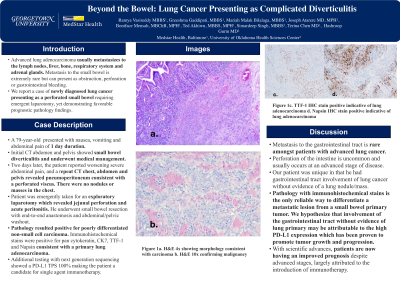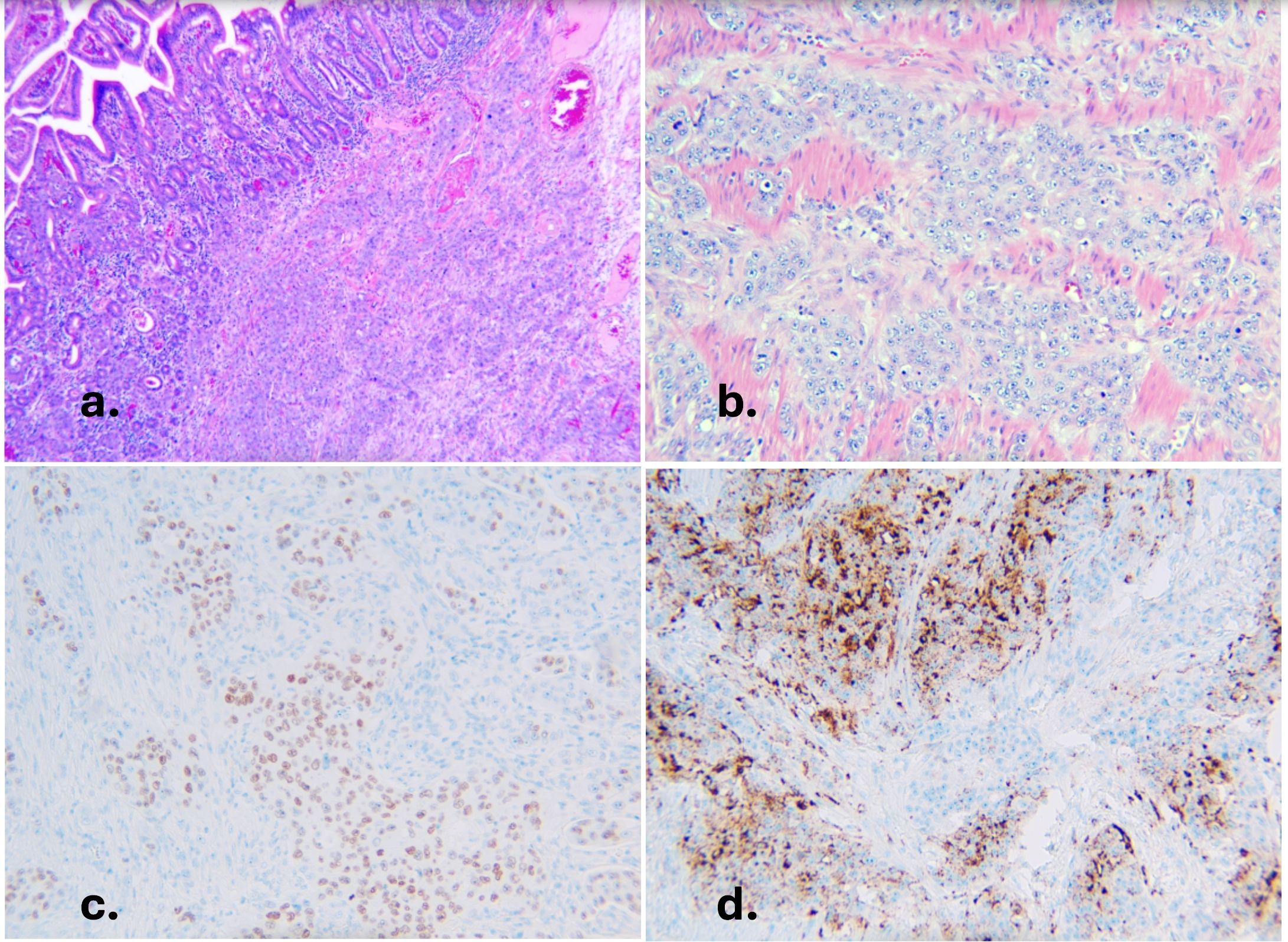Monday Poster Session
Category: Small Intestine
P3287 - Beyond the Bowel: Lung cancer Presenting as Complicated Diverticulitis
Monday, October 28, 2024
10:30 AM - 4:00 PM ET
Location: Exhibit Hall E

Has Audio

Ramya Vasireddy, MBBS
MedStar Union Memorial Hospital
Baltimore, MD
Presenting Author(s)
Ramya Vasireddy, MBBS1, Greeshma Gaddipati, MBBS1, Mariah Malak Bilalaga, MBBS1, Joseph Atarere, MD, MPH1, Boniface Mensah, MBChB, MPH1, Simardeep Singh, MBBS1, Ted Akhiwu, MBBS, MPH1, Terina Chen, MD2, Hashroop Gurm, MD3
1MedStar Union Memorial Hospital, Baltimore, MD; 2MedStar Franklin Square Medical Center, Baltimore, MD; 3University of Oklahoma Health Sciences Center, Oklahoma City, OK
Introduction: Lung cancer is the leading cause of cancer mortality in the United States. Advanced lung adenocarcinoma usually metastasizes to the lymph nodes, liver, bone, respiratory system and adrenal glands. Metastasis to the small bowel is extremely rare but can present as obstruction, perforation or gastrointestinal bleeding. We report a case of newly diagnosed lung cancer presenting as a perforated small bowel requiring emergent laparotomy, yet demonstrating favorable prognostic pathology findings.
Case Description/Methods: A 79-year-old current smoker presented with nausea, vomiting and abdominal pain of 1 day duration. Initial CT abdomen and pelvis showed small bowel diverticulitis. Surgery team was consulted and they recommended medical management with fluids and antibiotics. Two days later, the patient reported worsening severe abdominal pain and a repeat CT chest, abdomen and pelvis revealed pneumoperitoneum consistent with a perforated viscus. There were no nodules or masses in the chest. Patient was emergently taken for an exploratory laparotomy which revealed jejunal perforation and acute peritonitis. He underwent small bowel resection with end-to-end anastomosis and abdominal/pelvic washout. Pathology resulted positive for poorly differentiated non small cell carcinoma. Immunohistochemical stains were positive for pancytokeratin, CK7, TTF-1 and Napsin consistent with a primary lung adenocarcinoma. Additional testing with next generation sequencing showed a PD-L1 TPS 100% making the patient a candidate for single agent immunotherapy.
Discussion: Metastasis to the gastrointestinal tract is rare amongst patients with advanced lung cancer. Perforation of the intestine is uncommon and usually occurs at an advanced stage of disease. Our patient was unique in that he had gastrointestinal tract involvement of lung cancer without evidence of a lung nodule/mass. Pathology with immunohistochemical stains is the only reliable way to differentiate a metastatic lesion from a small bowel primary tumor. We hypothesize that involvement of the gastrointestinal tract without evidence of lung primary may be attributable to the high PD-L1 expression which has been proven to promote tumor growth and progression. With scientific advances, patients are now having an improved prognosis despite advanced stages, largely attributed to the introduction of immunotherapy.

Disclosures:
Ramya Vasireddy, MBBS1, Greeshma Gaddipati, MBBS1, Mariah Malak Bilalaga, MBBS1, Joseph Atarere, MD, MPH1, Boniface Mensah, MBChB, MPH1, Simardeep Singh, MBBS1, Ted Akhiwu, MBBS, MPH1, Terina Chen, MD2, Hashroop Gurm, MD3. P3287 - Beyond the Bowel: Lung cancer Presenting as Complicated Diverticulitis, ACG 2024 Annual Scientific Meeting Abstracts. Philadelphia, PA: American College of Gastroenterology.
1MedStar Union Memorial Hospital, Baltimore, MD; 2MedStar Franklin Square Medical Center, Baltimore, MD; 3University of Oklahoma Health Sciences Center, Oklahoma City, OK
Introduction: Lung cancer is the leading cause of cancer mortality in the United States. Advanced lung adenocarcinoma usually metastasizes to the lymph nodes, liver, bone, respiratory system and adrenal glands. Metastasis to the small bowel is extremely rare but can present as obstruction, perforation or gastrointestinal bleeding. We report a case of newly diagnosed lung cancer presenting as a perforated small bowel requiring emergent laparotomy, yet demonstrating favorable prognostic pathology findings.
Case Description/Methods: A 79-year-old current smoker presented with nausea, vomiting and abdominal pain of 1 day duration. Initial CT abdomen and pelvis showed small bowel diverticulitis. Surgery team was consulted and they recommended medical management with fluids and antibiotics. Two days later, the patient reported worsening severe abdominal pain and a repeat CT chest, abdomen and pelvis revealed pneumoperitoneum consistent with a perforated viscus. There were no nodules or masses in the chest. Patient was emergently taken for an exploratory laparotomy which revealed jejunal perforation and acute peritonitis. He underwent small bowel resection with end-to-end anastomosis and abdominal/pelvic washout. Pathology resulted positive for poorly differentiated non small cell carcinoma. Immunohistochemical stains were positive for pancytokeratin, CK7, TTF-1 and Napsin consistent with a primary lung adenocarcinoma. Additional testing with next generation sequencing showed a PD-L1 TPS 100% making the patient a candidate for single agent immunotherapy.
Discussion: Metastasis to the gastrointestinal tract is rare amongst patients with advanced lung cancer. Perforation of the intestine is uncommon and usually occurs at an advanced stage of disease. Our patient was unique in that he had gastrointestinal tract involvement of lung cancer without evidence of a lung nodule/mass. Pathology with immunohistochemical stains is the only reliable way to differentiate a metastatic lesion from a small bowel primary tumor. We hypothesize that involvement of the gastrointestinal tract without evidence of lung primary may be attributable to the high PD-L1 expression which has been proven to promote tumor growth and progression. With scientific advances, patients are now having an improved prognosis despite advanced stages, largely attributed to the introduction of immunotherapy.

Figure: Figure 1: a. H&E 4x showing morphology consistent with carcinoma b. H&E 10x confirming malignancy c. TTF-1 IHC stain positive indicative of lung adenocarcinoma d. Napsin IHC stain positive indicative of lung adenocarcinoma
Disclosures:
Ramya Vasireddy indicated no relevant financial relationships.
Greeshma Gaddipati indicated no relevant financial relationships.
Mariah Malak Bilalaga indicated no relevant financial relationships.
Joseph Atarere indicated no relevant financial relationships.
Boniface Mensah indicated no relevant financial relationships.
Simardeep Singh indicated no relevant financial relationships.
Ted Akhiwu indicated no relevant financial relationships.
Terina Chen indicated no relevant financial relationships.
Hashroop Gurm indicated no relevant financial relationships.
Ramya Vasireddy, MBBS1, Greeshma Gaddipati, MBBS1, Mariah Malak Bilalaga, MBBS1, Joseph Atarere, MD, MPH1, Boniface Mensah, MBChB, MPH1, Simardeep Singh, MBBS1, Ted Akhiwu, MBBS, MPH1, Terina Chen, MD2, Hashroop Gurm, MD3. P3287 - Beyond the Bowel: Lung cancer Presenting as Complicated Diverticulitis, ACG 2024 Annual Scientific Meeting Abstracts. Philadelphia, PA: American College of Gastroenterology.
